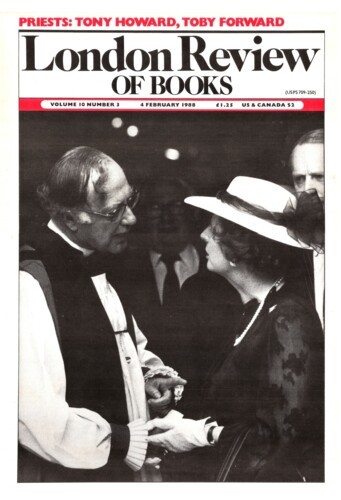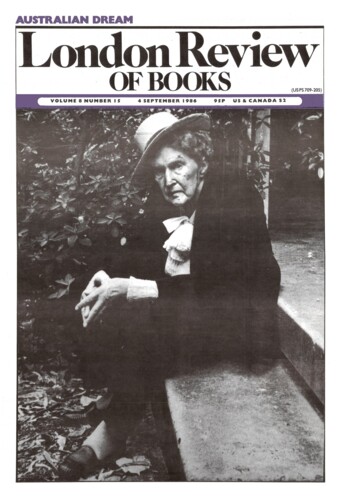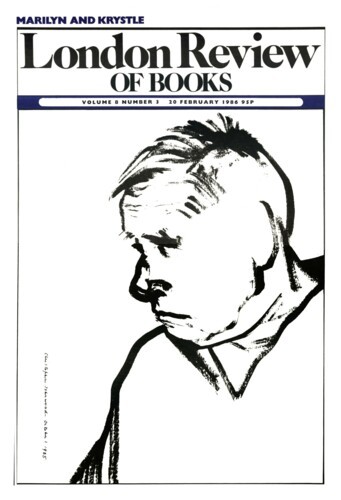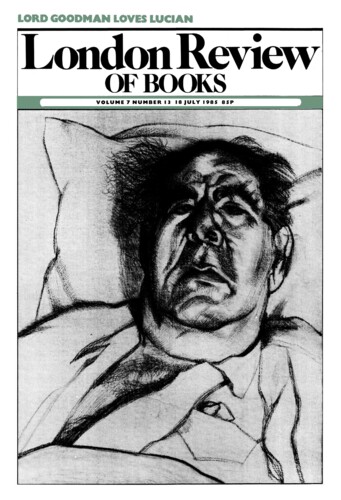Christopher Norris
Christopher Norris a lecturer in English at the University of Wales Institute of Science and Technology, is the author of a study of William Empson and of Deconstruction: Theory and Practice.
Paul de Man’s Past
Christopher Norris, 4 February 1988
On 1 December 1987 the New fork Times ran a piece under the title ‘Yale Scholar’s Articles Found in Nazi Paper’. The scholar in question was the late Paul de Man, who had written these pieces during the early Forties before leaving Belgium for America. They were published in Le Soir, a newspaper of pro-Nazi sympathies, and contain many passages that can be read as endorsing what amounts to a collaborationist line. There is talk of the need to preserve national cultures against harmful ‘cosmopolitan’ influences; of the Jewish element in modern thought as a threat to this healthy condition; and of German literature as a model for those other, less fortunate traditions that lack such a strong national base. Their language often resorts to organicist metaphors, notions of cultural identity as rooted in the soil of a flourishing native literature. One could draw comparisons with a work like Eliot’s Notes Towards the Definition of Culture, where it is likewise argued that the vitality of ‘satellite’ traditions (for de Man, crucially, the French, Dutch and Belgian) must depend on the continuing existence of a strong hegemonic centre. But of course de Man was writing at a time and in a political situation where thoughts of this kind carried a far more dangerous charge. These texts are utterly remote from de Man’s subsequent writings, not only in their crudity of utterance and sentiment, but also in the way that they uncritically endorse such mystified ideas as the organic relation between language, culture and national destiny, ideas which he would later ‘deconstruct’ with such extreme sceptical vigilance.
Semiotics Right and Left
Christopher Norris, 4 September 1986
The sheer bulk of this volume – as well as its highly miscellaneous character – suggests one of the problems about modern semiotics, considered as a discipline or field of study. It is hard to draw the line as to just what should count as a properly ‘semiotic’ line of enquiry, given that the field extends to every kind of signifying process or activity. At the limit (as in many of the essays here) it is not so much a method, theory or discipline as a generalised pretext for making observations that would otherwise lack any handy descriptive label. Of course there have been those – Saussure and the early Roland Barthes, among others – who held out the prospect of a unified endeavour that would place semiotics on a genuine scientific footing. Such was the dream of method that found its most ambitious expression in the structuralist ‘revolution’ of the human sciences proclaimed by various disciples of Saussure. Linguistics was to serve as the pilot methodology, the basis for a universal science of signs. Anthropology, political theory, psychoanalysis and even (according to Piaget) mathematics and the ‘hard’ sciences – all were to be seen as constituent fields of this overarching programme. Their interests converged on a handful of propositions about the workings of language – derived mostly from Saussure and Jakobson – which seemed to point beyond ‘linguistics’ as such to a much larger theory of mind, culture and signifying systems in general. Semiotics (or semiology, as the French preferred to call it) was set to usher in this bright new age of interdisciplinary endeavour.’
Names
Christopher Norris, 20 February 1986
There are many possible ways to describe Derrida’s text, none of them adequate but some less misleading than others. One can begin on safe ground, surely, by saying that Signsponge is ‘about’ the French writer Francis Ponge; that it involves a sustained and intricate meditation on the status of proper names and signatures in general; that it takes up themes from Derrida’s previous writing, notably from Limited Inc, his exchange with John Searle on the topic (supposedly) of speech-act philosophy; and that Signsponge is perhaps his most extravagant text to date, judged by all the normal, reputable standards of literary-critical practice. But having said all this one has really done no more than mark off a space in the (by now) quite familiar ongoing project known as Derridean deconstruction. And if there is one thing that Signsponge sets out to undermine it is the placid confidence that gathering texts under an author’s proper name is enough to ensure the substantial unity of a work, a corpus, an oeuvre. Derrida signs on, so to speak, at the point where most interpretation signs off: with the idea that putting one’s name to a text can ever be a simple gesture of containment, a claim to authorial copyright. What Signsponge calls into question is ‘the link (be it natural or contractual) between a given text, a given so-called author, and his name designated as proper’. And this it does by a species of massive and wilful impropriety, discounting the rule that would regard word-play on an author’s name as the merest of impertinent jokes.
Textual theory at the bar of reason
Christopher Norris, 18 July 1985
This book is by far the most sustained and intelligent critique of post-structuralist theory yet published in Britain or America. It is argued from an adversary stance, but with a vigour and passion all too rare among opponents of ‘theory’ in whatever threatening shape or guise. According to Rose, it is the fault of post-structuralism, not that it has become too much embroiled in theoretical issues, but that it has failed to think through the problems bequeathed by philosophers in the critical tradition descending from Kant. That tradition she sees as having set the main terms for a debate whose categories are centrally those of jurisprudence, or the individual subject and his or her standing before the law. Post-Kantian philosophy is heir to certain problems in the nature of its own grounding concepts which cannot be simply pushed aside in the name of some radical break with ‘Western metaphysics’. Such gestures are a species of intellectual nihilism, a refusal to engage with hegemonic structures of reason, legality and ethical discourse alike. Taking issue with Foucault and Derrida especially, Rose argues that post-structuralism has not come out – as its proponents would claim – on the far side of those problems and antinomies that dominate classical reason. Rather, it has attempted to exclude them de jure from its own more ‘radical’ or liberated discourse, only to reveal how far it is in thrall to those same (unrecognised) critical motifs. In short, these thinkers have opted for a rhetoric of militant unreason, thereby depriving thought of any power to criticise its own concepts and categories.’
Pieces about Christopher Norris in the LRB
Return of the real
A.D. Nuttall, 23 April 1992
The idea has got around – among ‘advanced’ thinkers of various political persuasions – that realist epistemologies are a thing of the past, that truth values in criticism...
Theory and Truth
Frank Kermode, 21 November 1991
The autumn catalogues of some very enterprising publishers announce as many books as usual under the rubric Literary Criticism, or possibly more, but few have titles of a sort that, even ten...
Paul de Man’s Abyss
Frank Kermode, 16 March 1989
Paul de Man was born in 1919 to a high-bourgeois Antwerp family, Flemish but sympathetic to French language and culture. He studied at the Free University of Brussels, where he wrote some pieces...
Sabotage
John Sturrock, 31 March 1988
Bait them and the Derrideans certainly rise. When the English version of Derrida’s Glas appeared last year in the United States*, I wrote a griping review of it, to regret mainly that a...
Untheory
Alexander Nehamas, 22 May 1986
The ancient quarrel between philosophy and poetry which Plato described, and in which he took part, is still being fought. Poetry today has become, more generally, ‘rhetoric’,...
Plain English
Denis Donoghue, 20 December 1984
Orwell took little care of his manuscripts. He didn’t anticipate that collectors of such things would pay real money for them, and that universities would think it a privilege to turn a...
Textual Harassment
Claude Rawson, 5 April 1984
In a recent review in this paper, Edward Said used the word ‘narrative’ about thirty times. This might have seemed a lot even in the present state of litcritspeak, and even in an...
Wild, Fierce Yale
Geoffrey Hartman, 21 October 1982
There are no Departments of Literary Criticism; and even proposals to have a Criticism question in official examinations can cause turbulence in academic circles. What is at stake? By now, of...
Read anywhere with the London Review of Books app, available now from the App Store for Apple devices, Google Play for Android devices and Amazon for your Kindle Fire.
Sign up to our newsletter
For highlights from the latest issue, our archive and the blog, as well as news, events and exclusive promotions.




